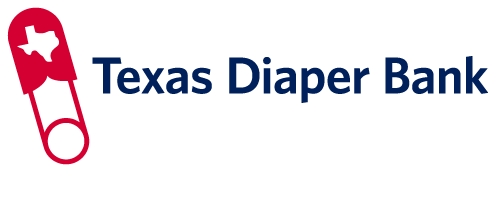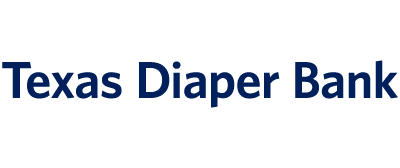Programs
Spend “Baby Bucks” at Market Days
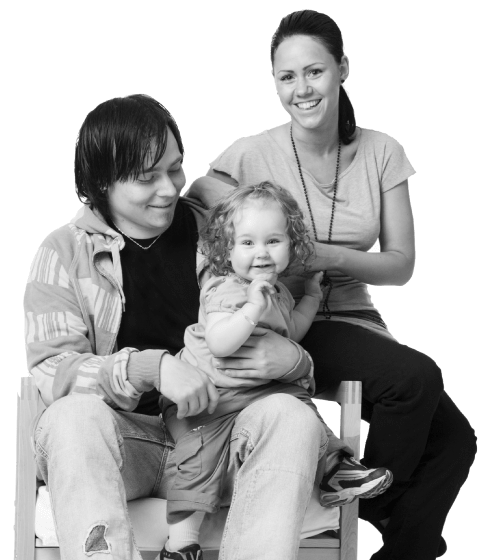
Closing the diaper gap in Texas
Focusing on closing the diaper gap, the Texas Diaper Bank strategically creates its programs to target the diaper gap’s root causes: physical, mental, and economic well-being. Through a combination of programmatic components, each program intently tackles one or more of these areas to ensure long-term impact.
Education
Job Readiness/ Work Force Training
Higher Education
Parenting Education
Support Services
Case Assessment or Management
Housing/ Shelter
Referrals
Goods
Diapers
Incontinence Supplies
Feminine Hygiene Supplies
Other Goods
Long-term impact
Reduced Familial Stress
Economic Well-being
Reduced Health Risks
Diaper Assistance
The Diaper Assistance Program focuses on providing families access to diapers, wipes, and other healthcare items through the Texas Diaper Bank facilities or partner agencies. In addition to basic baby needs, this program also offers educational parenting and health classes, all free of charge.
Population Served
Newborns and children up to the age of 4
Area Served
Bexar County
Services
- Case Assessment, Enrollment in Parenting Education, and Referrals – Texas Diaper Bank
- Case Assessment or Management, Housing/Shelter, and Referrals – Partner Agencies
Impact—2018
- 4,000 unduplicated individuals
- 740,000 diapers
Qualifications
Household income not exceeding 150% of the Federal Poverty Line
The following documents must be brought to the Texas Diaper Bank office:
- Parent/guardian photo ID
- Proof of guardianship
- Proof of income
- Child’s birth certificate

Calm Parent
While many nonprofits offer parenting skill classes, many neglect the importance of creating a stress-free environment. Filling this void, the Texas Diaper Bank developed its own curriculum that uniquely incorporates stress-reducing techniques. Through facilitators, the Calm Parent project teaches clients basic parenting skills. Participants not only gain valuable parenting skills, but also kits with the resources necessary to implement these newly-learned skills. The Texas Diaper Bank offers a set of 3 classes:
- Diapering
- Potty training
- Babyproofing
For example, a Calm Parent Potty Training kit contains a potty training chair, potty training children’s book, pull-ups, wipes, and reward stickers. Each class training module includes a “readiness checklist” of goals, as well as a list of common problems and calm parent solutions.
Population Served
Parents and Caregivers of children ages 0–4
Area Served
Bexar County
Services
- Parenting Education Courses
Impact—2018
- 275 individuals

My Healthy Child
Lessening the physical health impacts that the diaper gap inflicts, the Texas Diaper Bank focuses on child health and wellness classes. Through an exclusive partnership with Methodist Healthcare Ministries, the Texas Diaper Bank offers My Healthy Child classes in 8 counties. Taught by its team of professional Wesley Nurses from Methodist Healthcare Ministries, these workshops cover child healthcare topics that enable participants to parent better. To complement the skills that parents learn in the My Healthy Child class, the Texas Diaper Bank supplements materials that class participants learn about to apply these skills later.
Population Served
Parents and Caregivers of children ages 0–4
Area Served
Atascosa, Bexar, Comal, Dewitt, Dimitt, Frio, Gillespie, Guadalupe, Hays, Kendall, Kerr, Medina, and Wilson Counties
Services
- Parenting Education Courses
Impact—2018
- 950 individuals

Incontinence Assistance
Incontinence supplies, wipes, and other healthcare products are available to individuals aged 65 and older. During an interim application period for a Texas Medicaid Program, individuals aged 5-64 can also receive incontinence products with a doctor’s prescription/diagnosis.
Population Served
Clients ages 5–64
Area Served
Bexar County
Services
- Product Distribution
Impact—2018
- 10,000 unduplicated individuals
- 985,000 incontinence products
Qualifications
Household income not exceeding 150% of the Federal Poverty Line, Prescription/diagnosis of incontinence
The following documents must be brought to the Texas Diaper Bank office:
- Photo ID (Caretakers must be formally designated to receive items through a formal letter or Power of Attorney)
- Proof of income
- Proof of guardianship for those 18 years and younger

South Texas Alliance for Period Supplies
Healthy babies start with healthy moms. In conjunction with the National Diaper Bank Network’s Alliance for Period Supplies, the Texas Diaper Bank addresses the lack of access to period products and the effect that has on women’s lives.
Visit www.allianceforperiodsupplies.org for more information.
Population Served
Female clients
Area Served
Bexar County
Services
- Feminine hygiene product distribution
Impact—2018
- 3,633 individuals
Qualifications
Household income not exceeding 150% of the Federal Poverty Line
The following documents must be brought to the Texas Diaper Bank office:
- Photo ID
- Proof of income

Disaster Relief
In the chaos of a natural disaster, many evacuees lack the time or space to bring many items, especially diapers, wipes, and other healthcare products.
The Texas Diaper Bank fills this ignored gap by providing these healthcare products. Without these products, individuals may develop diaper rash, which may require medical treatment. In a disaster, treatment may not be an option, which can lead to fatal complications.
Similar to how federal funds do not pay for diapers, no international disaster relief for diapers exists.
Diapers distributed to date
Over 6 million diapers
Disaster aid provided to
- Hurricane Harvey (2017)
- Houston Flooding (2016)
- San Marcos Flooding (2015)
Impact—2018
- 14,350 individuals

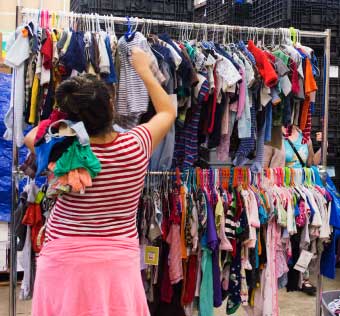
Market Days
Attending My Health Child classes, clients earn “Baby Bucks”. For its monthly Market Days, the organization fashions its warehouse to resemble a market. During Market Days, clients can shop for donated items, aside from the diapers and wipes they receive through the organization’s Earn & Learn projects and Emergency Assistance program, such as baby clothes, breast pumps, formula, car seats, and strollers.
Results: In FY 2017, Market Days allowed for the distribution of 15,500 items.
